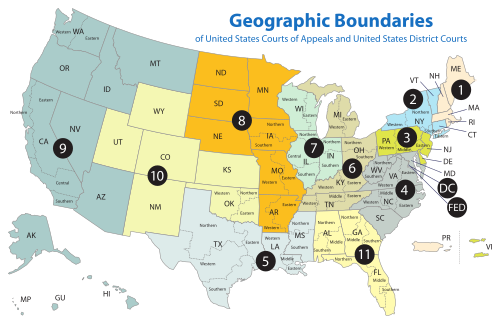|
United States District Court for the District of Nebraska
The United States District Court for the District of Nebraska (in case citations, D. Neb.) is the federal district court whose jurisdiction is the state of Nebraska. Court offices are in Omaha and Lincoln. Appeals from the District of Nebraska are taken to the United States Court of Appeals for the Eighth Circuit (except for patent claims and claims against the U.S. government under the Tucker Act, which are appealed to the Federal Circuit). The United States Attorney's Office for the District of Nebraska represents the United States in civil and criminal litigation in the court. As of August 17, 2024, the United States attorney is Susan T. Lehr, beginning on July 1, 2023.[1] Notable caseIn May 2005, Judge Joseph Bataillon struck down a constitutional amendment passed by Nebraska voters in 2000 that would have banned gay marriages. That decision, however, was reversed by the United States Court of Appeals for the Eighth Circuit. In its opinion issued on July 14, 2006, the Eighth Circuit held: the amendment rationally related to legitimate state interests, and therefore did not violate the Equal Protection Clause; the amendment could not be considered a bill of attainder; the amendment did not violate homosexuals' First Amendment right to associate; and the amendment did not violate homosexuals' First Amendment right to petition the government for redress of grievances. Current judgesAs of April 10, 2024[update]:
Former judges
Chief judgesChief judges have administrative responsibilities with respect to their district court. Unlike the Supreme Court, where one justice is specifically nominated to be chief, the office of chief judge rotates among the district court judges. To be chief, a judge must have been in active service on the court for at least one year, be under the age of 65, and have not previously served as chief judge. A vacancy is filled by the judge highest in seniority among the group of qualified judges. The chief judge serves for a term of seven years, or until age 70, whichever occurs first. The age restrictions are waived if no members of the court would otherwise be qualified for the position. When the office was created in 1948, the chief judge was the longest-serving judge who had not elected to retire, on what has since 1958 been known as senior status, or declined to serve as chief judge. After August 6, 1959, judges could not become or remain chief after turning 70 years old. The current rules have been in operation since October 1, 1982. Succession of seats
See also
Footnotes
Further reading
External links
|
||||||||||||||||||||||||||||||||||||||||||||||||||||||||||||||||||||||||||||||||||||||||||||||||||||||||||||||||||||||||||||||||||||||||||||||||||||||||||||||||||||||||||||||||||||||||||||||||||||||||||||||||||||||||||||||||||||||||||||||||||||||||||||||||||||||||||||||||||||||||||||||||||||||||||||||||||||||||||||||||||||||||||||||||||||||||

